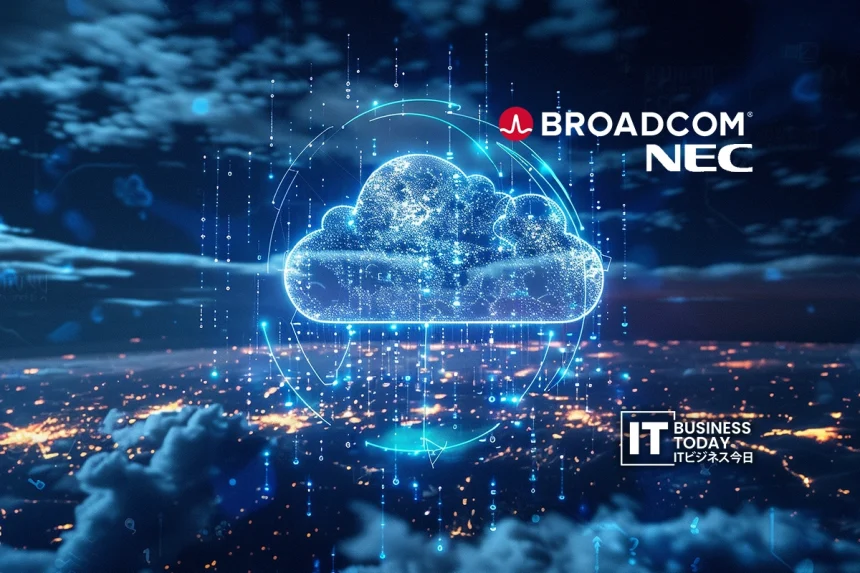Broadcom Inc. は、VMware Cloud Foundation を使用した最先端のプライベート クラウドの展開において、日本のテクノロジ リーダーである日本電気株式会社との戦略的契約を大幅に延長することを発表しました。この契約に基づき、NEC は独自の経験と深い技術的専門知識を活かして、日本のお客様が安全でコスト効率の高い方法でインフラストラクチャを近代化できるよう支援します。.
発表内容
この契約では
冒頭で述べたように、NECは “クライアントゼロ ”戦略の一環として、VMware Cloud Foundationを自社のITオペレーションに導入します。.
VCFベースのマネージドサービスは、2025年10月よりNECが提供する新サービス “NEC Private Cloud Infrastructure powered by VMware ”で提供されます。”
NEC の BluStellar シナリオ価値創造モデルでは、企業 IT を近代化するために Broadcom の技術を使用して VCF ベースのソリューションを顧客に提供する予定です。.
ブロードコムは、VCF(VMware Cloud Foundation)を、パブリッククラウドの俊敏性とプライベートクラウドのセキュリティ、パフォーマンス、TCOの削減を橋渡しする「初の統合クラウドプラットフォーム」と呼んでいます。VCFは、従来のアプリケーションから最新のアプリケーション、AIを活用したアプリケーションまで、さまざまなワークロードを単一のプラットフォーム上で実行します。.
NECがVCFを社内で利用するだけでなく、社外にも提供することで、プライベートクラウドのモダナイゼーションを実現し、高品質なマネージドサービスを提供することが可能になると考えています。.
こちらもお読みください: ハイレゾ、新しいNVIDIA B200GPUクラスタの計画を開始
日本のハイテク産業にとって重要な理由
今回の発表は、単なる企業間取引にとどまらず、日本のテクノロジー業界にとって戦略的な意味を持つものです。.
日本で加速するプライベートクラウドの導入
多くの日本企業にとって、最新のプライベートクラウドへの移行はデジタルトランスフォーメーションの中核をなすものです。NECがVCFの採用と再販の両方を決定したことで、日本企業は信頼できるパートナーとともにデータセンターを近代化するための実証済みの道を手に入れることができます。また、レガシーインフラからの移行をためらっていた顧客のリスクも軽減されます。.
安全保障、主権、コスト効率
日本の企業、特に規制産業や機密データを扱う企業にとって、データの主権とセキュリティは最も重要です。VCFを利用することで、パブリッククラウドに近い柔軟性を実現しながら、独自のプライベートクラウドを維持することができます。.
AIと最新ワークロードのサポート
VCFは、従来のワークロードだけでなく、最新のAI駆動型アプリケーションをサポートするように構築されています。そのため、BroadcomはVCF 9.0にプライベートAIサービスを搭載し、GPU、モデル ストア、ベクトル データベースをネイティブ サポートすることを発表しました。.
パブリックなハイパースケーラークラウドではなく、ローカルでAIワークロードを実行したいと考えている日本企業にとって、この統合プラットフォームは利益をもたらす可能性があります。.
エコシステムとイノベーション
ブロードコムと NEC のこの協力関係の強化は、プライベートクラウド環境をよりオープンで柔軟なものにするという大きな推進力に沿ったものです。ブロードコムは、AI のハードウェア認証 (VCF AI ReadyNodes) を可能にし、幅広いインフラストラクチャ パートナーをサポートすることで、オープンな VCF エコシステムに投資しています。.
つまり、日本企業はインフラの選択肢が増え、ベンダーのロックインが減り、イノベーションが加速する可能性があるということです。.
日本企業のデジタルトランスフォーメーション
NECの価値創造モデルであるBluStellar Scenarioは、日本企業が単にモダナイズするだけでなく、トランスフォーメーションを実現するための最適なポジションにあります。VCFとNECのドメイン専門知識およびマネージド・サービスを統合することで、製造、金融、政府機関などさまざまな業種の組織は、DXジャーニーをより速いペースで実現することができます。.
より広範なビジネスへの影響
日本だけでなく、Broadcom と NEC のパートナーシップは、世界的に多くの影響を及ぼします:
スケーラビリティと効率性:VCFは、従来のワークロード、最新のワークロード、AIなど、さまざまなワークロードを管理するための単一のプラットフォームを提供し、組織の複雑性を軽減してリソースの利用率を向上させます。.
オープンクラウドエコシステム: Broadcom は、オープン ネットワーキング、ODM の自己認証、オープン ソースへの貢献を通じて、よりオープンで柔軟なプライベート クラウド インフラストラクチャに向けて VCF を推進していきます。.
AIに対応したインフラ Blackwell GPUなどのNVIDIA AIハードウェアのサポートにより、VCFはAIモデルを安全なプライベートクラウド環境に展開しようとする企業に適しています。.
デジタル主権: VCF上に構築されたプライベート・クラウドを利用することで、企業や政府は、データのコントロールを失ったり、パブリック・クラウドに完全に依存するリスクを負うことなく、クラウドネイティブな機能を活用することができます。.
課題とリスク
しかし、この先にはある課題があります:
マイグレーションの複雑さ:VCFが管理するプライベート・クラウドへのレガシー・システムの移行は、特にインフラが深く浸透している組織にとっては、面倒で非常にコストがかかります。.
スキル・ギャップ: 最新のプライベートクラウドを運用するには、仮想化、クラウド管理、GPUインフラなどの専門的なスキルが必要です。NECとその顧客は、このような人材を構築するか、購入する必要があります。.
費用対効果の実現: プライベート・クラウドは長期的なコスト削減を実現します。ハードウェア、ライセンス、トレーニングへの先行投資は高額になる可能性があるため、顧客による慎重なROIの検討が必要です。.
セキュリティとコンプライアンス:プライベート・クラウドはよりコントロールしやすくなっていますが、データを安全に扱うためには、企業は強力なガバナンス、リスク、コンプライアンスの枠組みを導入する必要があります。.
結論
ブロードコムとNECは、VMware Cloud Foundation のさらなる導入に向けたパートナーシップを強化し、日本のエンタープライズクラウドインフラの近代化において重要な一歩を踏み出すことになります。NECは2025年10月より、プラットフォーム自体の利用を含め、VCFベースのマネージドサービスを提供する予定であり、今回の協業により、技術的な信頼性、運用経験、現地での知見が得られます。これにより、日本のテクノロジーセクターにおけるプライベートクラウドの導入が加速し、AIを活用したワークロードがサポートされ、業界全体のデジタルトランスフォーメーションが強化される可能性があります。オープンな設計でAIワークロードにネイティブに対応するVCFは、セキュリティと柔軟性をパフォーマンスで支える、現代の企業にとって魅力的なインフラプラットフォームとして適しています。.
の動き ブロードコム そして NEC は、プライベート・クラウドとAIが融合し、安全で効率的な高性能AIワークロードをビジネスに活用するという世界的なトレンドの一部です。まだ課題は残されていますが、これは日本の大手企業が将来に向けてクラウドインフラストラクチャを近代化するための青写真になるかもしれません。.








